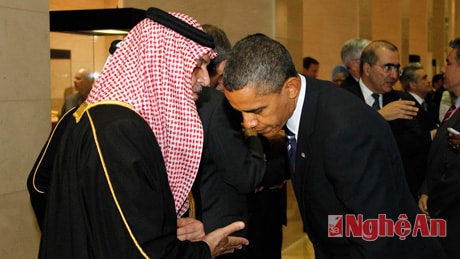US sells weapons to allies: One arrow hits many targets!
(Baonghean) - US President Barack Obama has just announced that he will allow Gulf Cooperation Council (GCC) member states to purchase certain defense equipment from the US as a unified bloc. Arms sales between the US and Gulf countries are not new, but will be upgraded to a higher level after this decision. According to analysts, this move by the US is like shooting an arrow and hitting many targets.
In a statement, President Obama stressed the need for Washington to lift restrictions on the sale of military equipment related to ballistic missile defense, maritime security and counterterrorism operations, thereby paving the way for major defense equipment purchases by the GCC. This was also an initiative proposed by US Defense Secretary Chuck Hagel earlier this month during a tour of the region, which emphasized the need for increased cooperation between GCC member states and the US.
 |
| President Obama speaks with Saudi Arabia's Foreign Minister, Prince Saud Al-Faisal, during a recent meeting. Source: Reuters |
The sale of weapons by the US to its allies in the Gulf is not a new move. However, up to now, the arms and military equipment deals between the US and the GCC countries have been limited to bilateral levels and mostly conventional weapons. The new decision by the White House paves the way for deals between the US and the entire GCC group, allowing US arms manufacturers to provide advanced equipment such as ballistic missile systems or coordinated radars... This is surprising, but not difficult to understand.
According to President Obama, providing defense equipment and services to the GCC will enhance US security and contribute to promoting regional stability. Meanwhile, US National Security Council spokeswoman Bernadette Meehan said the decision will allow the GCC to purchase necessary defense equipment and services to strengthen regional defense cooperation. Ms. Meehan emphasized that the plan shows the strong commitment of the US to the GCC as well as Washington's desire to cooperate with Gulf partners to promote regional stability and security.
The statements of the US senior leaders are consistent with the long-standing policy that this country has pursued, which is to maintain its presence and influence in the Middle East region. However, behind the decision to expand the sale of military equipment, people see that the US wants to "please" its traditional ally after a series of recent tensions between the two sides.
It should be recalled that the so-called "Arab Spring" movement has caused GCC member states, especially Saudi Arabia, to disagree with the US on how to respond to the crisis in Syria and Egypt, as well as the instability in the countries within the group. Saudi Arabia has shown its dissatisfaction with Washington's policy in the region by refusing a non-permanent seat on the UN Security Council. In addition, President Barack Obama's "pivot" to Asia strategy, the US's cuts in military spending and its reduced dependence on imported oil have also made Gulf countries skeptical about Washington's long-term commitments to the region. The suspicion has also reached a new height when the US has moved closer to Iran, especially after reaching a historic preliminary agreement on the nuclear program in Geneva (Switzerland) at the end of November. These countries fear that a more detailed deal (expected to be completed in the next six months) on Iran's controversial nuclear program could threaten their security and that lifting sanctions would allow Tehran to consolidate its power in the region.
Therefore, the expansion of arms sales to the Gulf countries this time is considered a guarantee that the US will stand side by side with its allies in dealing with Iran's ballistic missiles and many other threats. However, Washington's calculations do not stop there. International military commentators believe that this decision of the Obama administration has shot two birds with one stone: appeasing allies and gaining profits. It is well known that the GCC includes most of the world's leading oil exporting countries.
In the context of rising oil prices, the GCC's financial reserves are estimated at about $2,000 billion, expected to increase to $2,400 billion by 2014, while the bloc's gross domestic product is about $1,600 billion. These countries are in dire need of sophisticated weapons to realize their long-term goal of establishing a real security alliance in the region. This is clearly a fertile market for US arms manufacturing corporations. Once expanding and upgrading arms sales, the US defense industry will have the opportunity to earn a large budget - which is especially beneficial in the context of the world's number 1 economy still being gloomy. Obviously, from any perspective, expanding arms sales will bring both short-term and long-term benefits to the US.
Thanh Huyen
